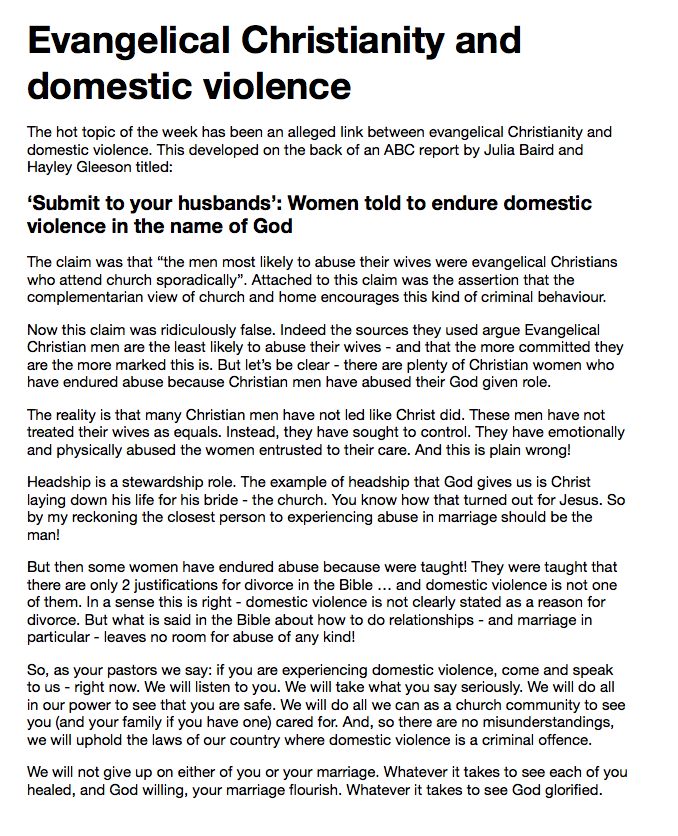You would think that in the wake of the ABC’s damning report on domestic abuse among evangelical Christians, leaders of evangelical churches would take a moment to ensure they understand domestic abuse, consider the ways it might be hiding out in their congregations, and take proactive steps to help possible victims feel safe within their communities.
Instead, we’re seeing responses like this from a Newcastle evangelical church (published on the cover of its weekly newsletter on Sunday):
Despite the opening sentence, it’s actually one of the better responses–it acknowledges that Christian husbands are sometimes abusive, and that Christian wives sometimes accept it because they believe they should–but it’s also defiant, insensitive, and hypocritical.
It makes no sense to open with refusal to believe clearly presented evidence of abuse (“alleged link”, “ridiculously false”, etc.), while simultaneously promising victims that “we will listen to you” and “take what you say seriously”.
The ABC report was thoroughly researched and its accuracy remains unimpeached, despite spurious claims by Andrew Bolt and The Australian (see the ABC’s response to those). The reporter, Julia Baird, is an accomplished journalist who also happens to be a pro-church Christian, so claims of an anti-Christian agenda are equally nonsensical. And it’s demonstrably true that Christian abusers use the Bible to manipulate and control their partners, so arguing about whether or not this requires incorrect theology isn’t useful.
Stating, without evidence, that Baird’s report was “ridiculously false” creates immediate hostility towards readers who are abuse victims, deepens their sense of isolation and insignificance, and destroys trust in the church’s leadership. It offers the polar opposite of loving concern for victims of domestic abuse, who almost certainly exist in this and many other churches.
The flippant tone of subsequent acknowledgements of Christian abuse amplifies this error (e.g. “this is plain wrong!”). Domestic abuse has devastating impacts and failing to respond to it with proper seriousness demeans victims rather than supporting them.
The opportunity to properly describe the nature of domestic abuse is also missed. Victims frequently assume abusive behaviours from their partners are their own fault, i.e. not abuse at all, so this is unforgivable. Non-violent abuse (whether sexual, financial, emotional or spiritual) is widely regarded as equally if not more harmful than physical violence, but is consistently downplayed by victims and observers. This church’s superficial reference to “emotional and physical abuse” does little to help women who already doubt that they deserve better than what they’re getting from their husbands–a simple list of abuse types would have made a significant difference.
I won’t comment on “headship” as a “stewardship role”. The merit or otherwise of complementarian theology is a topic for another day, but including this sentence when talking about domestic abuse beggars belief: “So by my reckoning the closest person to experiencing abuse in marriage should be the man!” The writer’s point, I think, is that if Christian marriages were to match the metaphor of Jesus marrying the church, the man would be the one crucified (abused), if anyone is. It’s a worthless hypothetical expressed so poorly that it appears to be a flippant reference to male suffering–as if that belongs in a discussion that rightly emphasises the suffering of women in abusive Christian marriages.
The pastor goes on to suggest that although abuse doesn’t belong in Christian marriages, it’s not actually a reason for divorce, officially, but maybe it might be ok, except the Bible says no. In the final paragraph, he adds, “We will not give up on either of you or your marriage”. Or, to paraphrase, “Bringing your abuser into the conversation in an attempt to save your marriage will be more important to us than your welfare.”
Victims are assured that “we will do all in our power to see that you are safe”, but everything else about this response indicates they will do the opposite. They will quickly include the abuser in the conversation (risking repercussions for the victim). They will be unlikely to believe the victim (since abusers are expert liars, distressed victims rarely present as reliable witnesses, and according to this pastor, not even investigative journalists with relevant studies, hours of interviews, and an independent news organisation behind them are capable of providing credible testimony regarding abuse). And they will prioritise keeping the victim and the abuser married (because apparently the sanctity of marriage isn’t compromised by abuse).
But it’s ok, because “we will uphold the laws of our country where domestic violence is a criminal offence”.
Women deserve better than this. We must insist on it.
